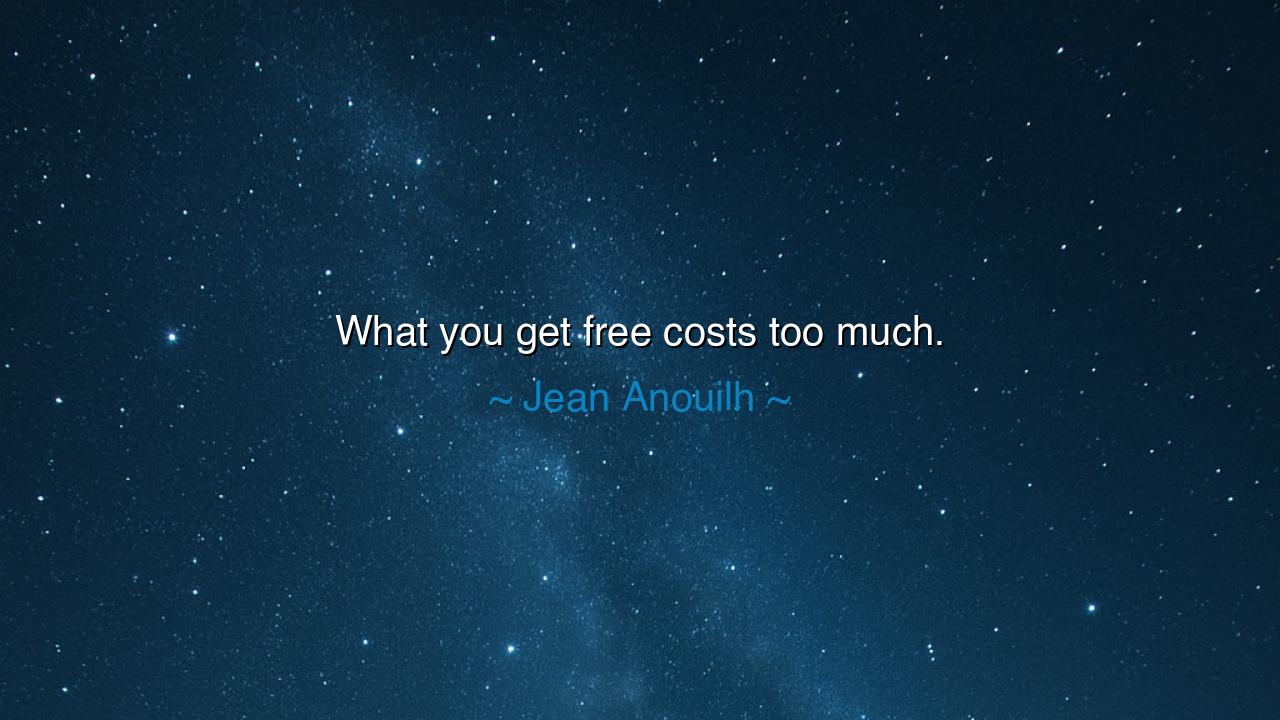
What you get free costs too much.






There are few truths more piercing, few warnings more timeless, than those contained in the simple words of Jean Anouilh: “What you get free costs too much.” At first, the phrase seems a paradox — how can that which is given freely come at the highest price? Yet within it lies a deep wisdom, the kind that speaks to the heart of human character. For in every age and every soul, there is a temptation to take what is easy, to accept without earning, to receive without striving. But the wise know that what is unearned often erodes the spirit, while what is earned through struggle strengthens it. The things gained too easily seldom hold their worth, and the things given without cost often demand payment from the soul.
The origin of this thought arises from the hard-won understanding of human nature. Anouilh, a French dramatist writing in the aftermath of war and moral confusion, saw how societies weakened when comfort replaced conviction, and how individuals decayed when they mistook gifts for blessings. He had lived through a Europe where freedom, once bought with blood, was later taken for granted — where the people learned that cheap ideals could destroy even the greatest civilizations. Thus, his words carry not cynicism, but solemnity: beware of what comes too easily, for every freedom, every treasure, every joy worth having requires sacrifice.
Consider the story of the Prodigal Son, told in the sacred scriptures. A young man demanded his inheritance early — a fortune he had not earned — and squandered it in the pursuit of pleasure. His wealth was free, but the cost was ruin; his liberty was unearned, and it led him into chains. Only when he humbled himself to labor and repentance did he regain what was truly valuable: dignity, wisdom, and reconciliation. So it is with life itself. When we grasp at the gifts of fortune without the discipline to bear them, we pay dearly — with our integrity, our purpose, or our peace. What we gain without labor is often lost without grief, and what we are given without merit too easily corrupts the heart.
History, too, echoes this warning. When Rome fell, it was not by the sword of her enemies, but by the softness of her own ease. The citizens of that mighty republic grew accustomed to grain given freely, games played endlessly, and pleasures poured forth without effort. The price of luxury was the decay of virtue. The Rome that had once conquered nations through discipline and courage was conquered in turn by its own appetite for comfort. What was gained for free — bread and spectacle — cost the empire its soul. So it is with all peoples and all times: when a society forgets that freedom and prosperity must be earned anew each generation, it begins to pay a price far greater than coin — the slow death of character.
In our own day, Anouilh’s wisdom remains as vital as ever. Too often, people crave the shortcut to success, the easy path to pleasure, the unearned reward. But those who chase ease find that they pay with anxiety, emptiness, or dependence. True happiness is never purchased by another’s labor; it is forged through one’s own perseverance. The illusion of free gain is the oldest trap of mankind — the siren’s song that lures the unwary to wreck their purpose upon the rocks of indulgence. It whispers, “Why strive, when you can have?” Yet every soul that listens soon discovers the truth Anouilh spoke: that what is free costs too much, for it takes from us the very thing that makes life worth living — the joy of earning, creating, and becoming.
Even the smallest acts of effort — the worker’s craft, the student’s study, the parent’s care — bring forth a nobility that no gift can imitate. Labor gives meaning to reward; struggle gives weight to victory. To live rightly is not to avoid cost, but to choose the right price to pay. Better to sweat in honest toil than to wither in effortless comfort. Better to build slowly with your own hands than to inherit swiftly what you cannot sustain. For the soul that never struggles never grows, and the life filled with gifts but empty of effort is but a hollow shell.
So, my child, take this teaching as your compass: value nothing that costs you nothing. Let your labor sanctify your blessings, and let your effort be the proof of your desire. When fortune offers you ease, ask what it will take from your strength; when others offer you gifts, ask what they may demand of your freedom. Remember that everything of worth — wisdom, love, independence, virtue — comes not as a gift, but as a triumph. The world may tempt you with things that seem free, but the wise heart knows that every true treasure demands a price, and that the highest price worth paying is the one that leads to the dignity of a soul earned, not granted. For what you get free costs too much, but what you win with courage is yours forever.






AAdministratorAdministrator
Welcome, honored guests. Please leave a comment, we will respond soon